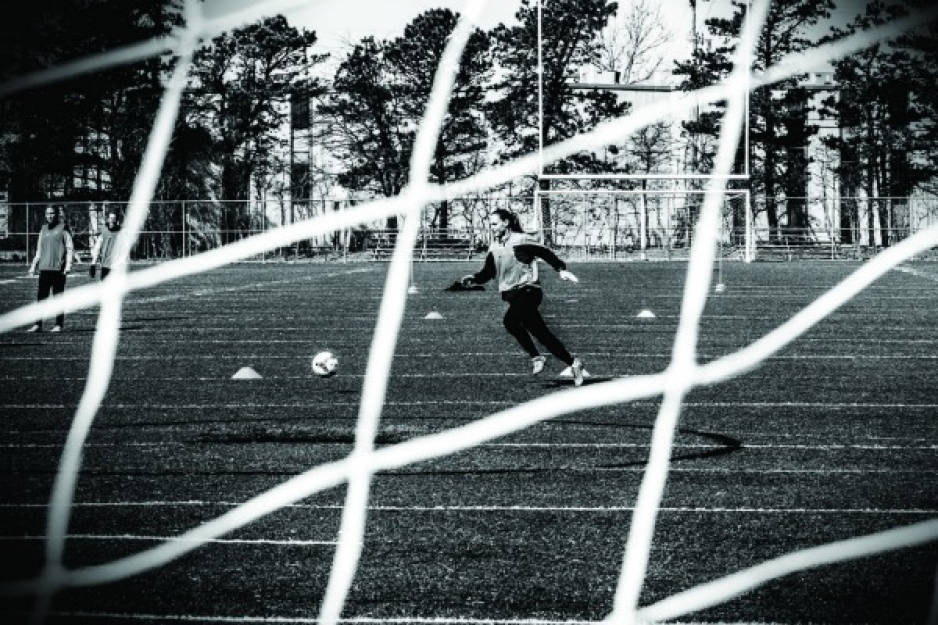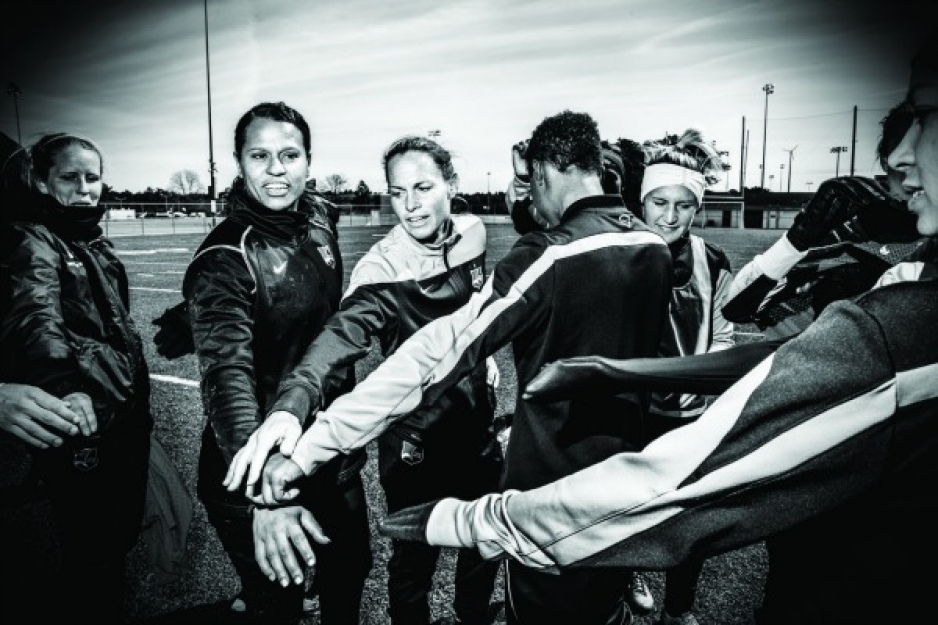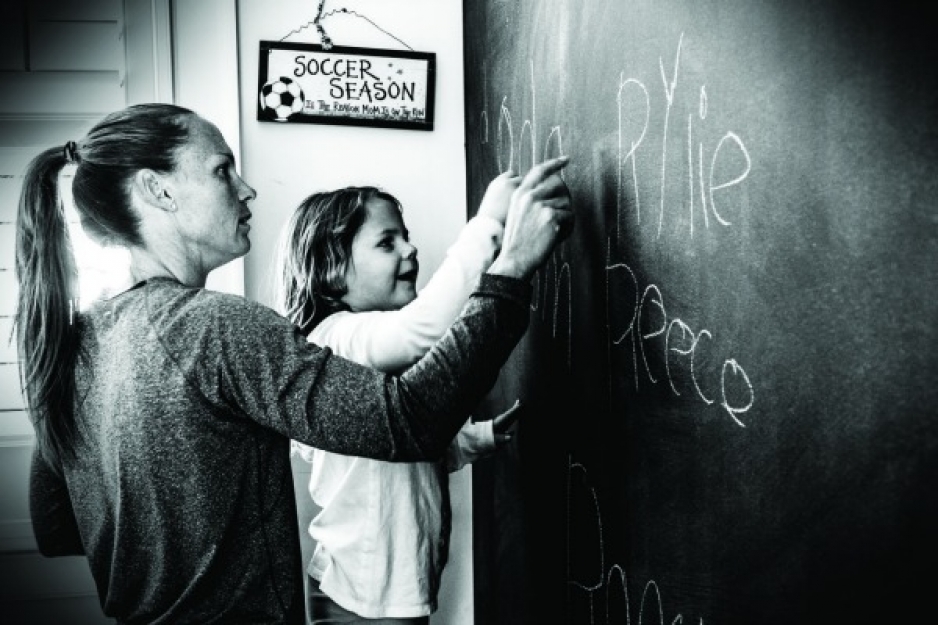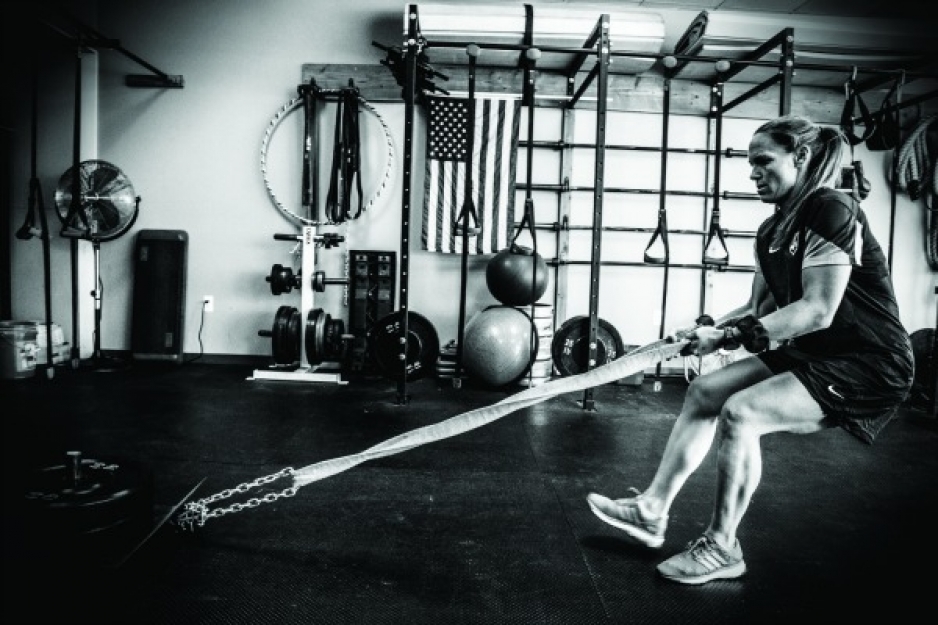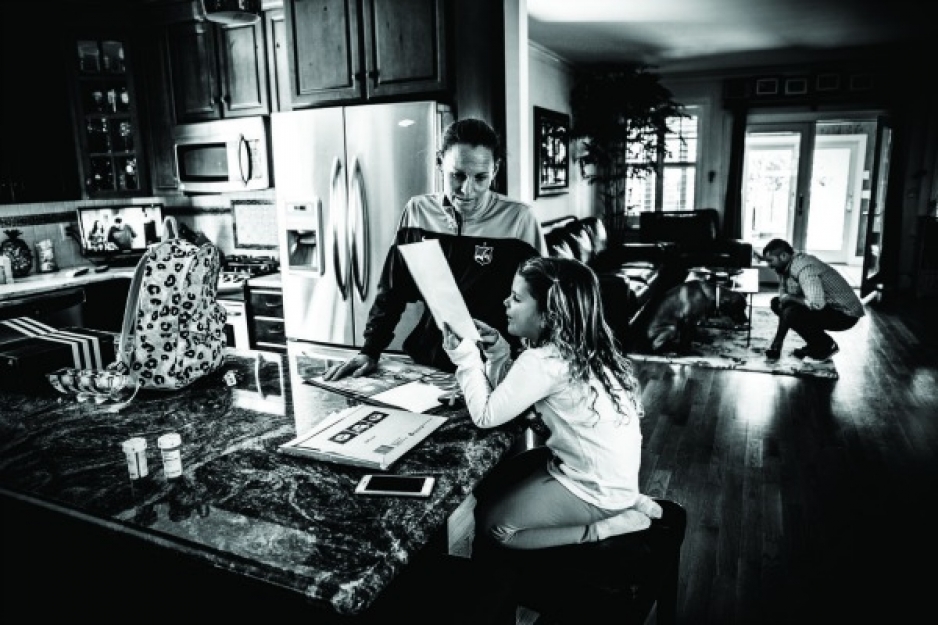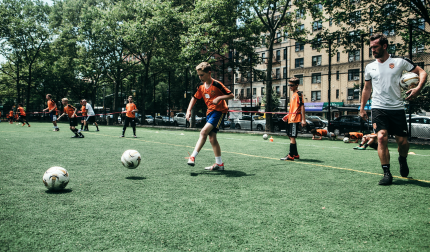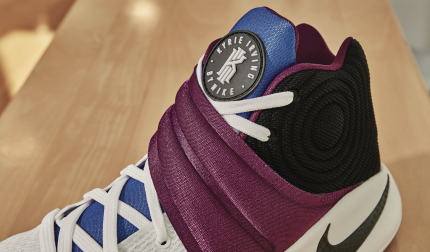As the wind whips across the modest turf field behind the Drum Point Elementary School, it is a harsh reminder that it is still winter. The temperature dips below freezing on this March day. Powerful gusts send water bottles somersaulting and blow stray pieces of tape across the home field of the Pee Wee football and soccer programs in Brick, New Jersey.
On weekday mornings, while the Pee Wees are in school, the field also serves as the practice home for the Sky Blue FC of the National Women’s Soccer League. In a few months, the field will be sprawling with vacationing kids spending the summer near the beach. But on this near-freezing winter morning, the only woman here who is on vacation is having her ankles taped for practice.
Among the Sky Blue players, many of whom are fresh out of college, the voice of the fastest player on the field stands out. It belongs to Christie Rampone, the only active member left of the immortalized 1999 US Women’s National Soccer Team—the last US team to win the Women’s World Cup.
Technically, this is Rampone’s “week off” from soccer. As the captain of the current US Women’s Soccer National Team, the 39-year-old has just completed several weeks of duty abroad with her compatriots. Their most recent tour culminated with a victory in the Algarve Cup in Portugal, one of the last major tournaments before the team heads to Canada in June to compete for the World Cup.
As Team USA’s only mom, Rampone was looking forward to getting back home to New Jersey and spending time with her husband, Chris, and her two daughters (Rylie, 9 and Reece, 5). “I’m not supposed to report here until next week,” she says regarding her obligation to the Sky Blue. “But the field is only a few miles from the house, so what am I supposed to do, sit at home while they practice?
As a member of the Sky Blue, Rampone is not just the franchise’s most accomplished player. She is also a coach, mentor, role model, legend, oracle, mother figure, guidance counselor and sometimes food source to the players, many of whom are experiencing their first taste of professional life.
After dropping off Rylie and Reece at their respective schools this morning, Rampone headed to the field to tape up and get a practice in. Despite having just competed with and against the greatest female players in the world, she decides not to pass up an opportunity to work with her Sky Blue teammates, some of whom are new to the team.
The practice, which includes many of the male coaches filling in as players for the women who have yet to report to training camp, is almost as brisk as the weather. For two hours, the team works on both ends of the field, as coaches emphasize controlling the ball and the pace of the game. Rampone is engaged at every moment, shouting both instruction and encouragement to the younger players.
When the uncomfortably cold practice ends, the players and coaches head to one end of the field to stretch. Not ready to call it a day, Rampone decides to recruit goaltender Brittany Cameron to join her for a series of sprints across the blustery field.
They sprint the length of the field once, twice, three times. Even running in second gear, after a two-hour practice, Rampone glides several steps ahead of Cameron, staying just close enough to push her teammate to try to catch her. It’s no slight to Cameron, an accomplished athlete in her own right. She just happens to be racing against one of the most athletic players in women’s soccer history.
Rampone hasn’t lost a step as she prepares for her fifth World Cup. In fact, she looks like she is trying to gain one. “However old she is, I can’t keep up with her,” Cameron says afterward. “But the amazing thing about Christie, is that after all she’s accomplished, and everything she can still do on the field, she never puts herself above anybody else. She’s always trying to help everyone, on and off the field.”
When the sprints are over, Rampone and Cameron head to the sidelines, where many of their teammates have already put on their coats and are heading for the warmth of their cars. As Rampone sits on the turf, cutting the tape from her ankles, one of her youngest teammates approaches her. With her feet still bare on the frigid turf, the three-time Olympic gold medalist with over 300 international caps sits and listens patiently as a teammate asks for her advice about something she’s had trouble mastering on the field. Much like the iconic players on that 1999 World Cup team did for her, Rampone passes down whatever advice she feels the player is ready to receive.
“They’ll ask a lot of questions, which is good,” Rampone says. “But I’m trying to help them understand that sometimes it’s better for you to figure out some things on the field. You have to be able to think for yourself out there.
Being a soccer icon wasn’t Rampone’s plan. She was always a stellar athlete. She may be the greatest all-around female high school athlete that New Jersey has ever produced. But basketball was always her game. At Point Pleasant High School, just a few miles from where she now resides, the athlete formerly known as Christie Pearce was the first female athlete in New Jersey state history to lead her conference in scoring in three sports—soccer, field hockey and basketball.
After being heavily recruited, Rampone decided to play basketball close to home at Monmouth University, a small Division 1 school, where she would become the captain of the basketball team. When basketball wasn’t in season, she simply walked on to make the soccer and lacrosse teams and immediately excelled there as well.
For Monmouth’s soccer team, Rampone continued to score goals at an astounding pace. After starting all 80 games while she was there, she led the team with 79 goals and 54 assists, setting the school record for points in a season. “It was so much fun,” she says. “But honestly, once I finished my senior season, I thought my soccer career was over. I was ready to play my final year in basketball, and then I was going to be a special education teacher.”
That was when the US National Soccer team came calling. Unbeknownst to Rampone, her soccer coach was sending tapes of her to the US Soccer program. The US coach, Tony DiCicco, even came to see her play. The US Team wanted Rampone to drop everything and come try out, leaving Rampone with a big decision to make. As captain of Monmouth’s basketball team, she felt obligated to play her final season. “We talked about it a lot,” Rampone remembers. “Thankfully, the school and everyone felt that I needed to give the US Soccer Team a chance. It was too good of an opportunity to pass up.”
So as a college senior, Rampone stepped on the field with US women’s soccer’s best of the best. It was like a Hall of Fame that had come to life—Michelle Akers, Mia Hamm, Joy Fawcett, Carla Overbeck, Kristine Lilly, just to name a few. “It was a complete eye opener to me,” Rampone says. “Growing up, I was the best at my sport. I was always the fastest and quickest. I wasn’t the most technically sound player, but I was more athletic. Then you step on to a field where everyone is the fastest and everyone is athletic. I didn’t have any idea what fitness was like at that level. The first practice, I ran around like a chicken with its head cut off for five minutes, and then I was absolutely gassed.”
Fitness wasn’t the only challenge. “I was a forward my whole life,” she says. “In my first training camp, almost immediately, they put me on the backline, so it was a whole new experience for me. But leaving that camp, I had a taste of what it could be. I said this is something I see myself doing. I knew I had potential, but I wasn’t there yet.”
From that moment on, Rampone dedicated herself to making the team and staying on it. She never allowed fitness to be an issue again in her career. If she wasn’t good enough to make the team, so be it. But it wasn’t going to be because she couldn’t keep up.
After working on her technical game and fitness for a full year, Rampone played her way onto the famous ‘99ers, the last US team to achieve World Cup glory. Then, her life changed forever.
“It was crazy,” she says. “After we won the World Cup, we were like rock stars overnight. We became so well known so fast. It was the first major tournament in my life. Coming from a small college, we were never in the NCAA tournament. So now, we were being recognized everywhere we went. Even though I had a smaller role on that team, coming back home, everyone was so excited for me. ‘You’re asking for an autograph? Really? It’s me! Christie!’”
The ‘99ers launched a generation of young girls who wanted to live that dream, including many members of the 2015 team such as Alex Morgan. “To me, that 1999 team was everything,” says Morgan, who was 10 at the time. “I played all kinds of sports when I was younger. But seeing them play in front of 80,000 people? I had no idea that female athletes could be that popular. It was just soccer after that.”
Since then, the US Team has tried to reclaim that glory and inspire a new wave of young players. The team finished third in the 2003 and 2007 tournaments. In 2011, they fell just short to a resilient Japanese team. As the last connection to the 1999 champions, Rampone understands her role as captain.
“I’ve learned so much from winning that World Cup that I am trying to pass on to this generation,” she says. “But you can’t put too much pressure on them, as if it’s win or it all means nothing. It’s trying to share the experiences that I’ve had and help this team grow and be the best in the world. We’ve been great in the Olympics, but its time to win a World Cup.”
Rampone stops briefly at The Training Room, a local fitness facility where she often visits after dropping the kids at school if there isn’t a practice scheduled, and occasionally on days when she does. “I’ll try to get here three days a week during the season,” she says. “If I do four, I’m a little gassed.”
It’s here where Rampone does her lifting, working on explosive movements. “You can’t get game fit from running,” she explains. “You need way more than that.” She demonstrates part of her routine by placing two 45-pound plate on a sled and then dragging the sled back and forth across the floor of the gym easily, despite having just practiced for two hours in freezing temperatures.
From the gym, Rampone drives over to pick her youngest daughter Reece up from school at noon. “Thankfully, the practice schedule works really well,” she says as they head for home.
How is she able to juggle it all? Soccer, practice, travel, school for the kids, dance classes, swimming lessons, taking them to their own soccer practice?
“Carla Overbeck was a mom when she played on the National Team,” Rampone says. “I never expected to be one. I thought that there’s no way I could handle all of it. But after being married to Chris for a couple of years, we wanted to start a family. I realized that there were four years in between every World Cup. You know the timing of it, so you try to see if the body can come back. It was scary, because you know you are giving something special up for something even greater like having a family.”
But was Rampone prepared to leave soccer behind if she couldn’t make it all the way back? “Probably not. (laughs) I still wanted to play,” she says. “I was going to do everything in my power to get back to where I used to be and to get back on the National Team. It was an emotional roller coaster, but I was able to become a mom and then enjoy playing soccer. It put things into perspective. Everything didn’t have to revolve around soccer.
As we arrive at the Rampone house, husband Chris greets everyone from the front porch. Chris, a former collegiate baseball pitcher and coach, now works from home and keeps the Rampone household running smoothly while Christie is on the road. During a busy international season, Christie can be on the road as many as 200 days a year. Chris and the kids will join her as much as they can.
“Look at what Reece learned today,” Christie tells her husband. “Show daddy what you learned!” Reece unzips her pink fleece jacket and then methodically reassembles the zipper and pulls it all the way up to her neck. “I can do it myself now!” Reece says proudly.
As we go inside, Rampone shifts into mom mode at the same speed she shifts from defense to offense on the field.
“Can I write on the board, mommy?” Reece asks.
“Sure, baby,” Rampone answers. “Show me how you write your name.”
Reece pulls up a small chair to stand on and begins writing on the slate wall in the dining room made for such occasions. When she has trouble remembering how to spell the name of one of Rampone’s Sky Blue teammates, Rampone writes the letters above, so that Reece can model them for herself.
As Rampone helps Reece spell various names, the owner of the most prominent name on the board, Brittany Cameron, enters through the side door of the house with fellow goalie, Aubrey Bledsoe. “Reeshka!” Cameron screams, lifting Reece into the air. “I miss you!”
Cameron and Bledsoe have stopped by to borrow a duffle bag filled with new soccer balls and a battery-powered air pump for a clinic they are conducting that afternoon. Cameron got to know Rampone well when she lived in the house for several months during a previous season. “I used to live really far away from where we practiced,” Cameron says. “So Christie invited me to stay one night. Then two. Eventually, I ended up living there for three and a half months. It was a fluky thing that we made work. But it goes to show you how gracious she is.”
After her teammates leave, Rampone explains the hidden costs of being a professional women’s soccer player. “I’m really fortunate that being on the US Team, you now get a stipend so that you don’t have to hold down all the odd jobs to pay your bills. For most of the girls, coaching is a way to make some extra dollars. There’s some flexibility in the scheduling, so you can make it work. A lot of times, your first contract may only be a few thousand dollars. It’s not enough to live off of.”
“You know it’s late in the season,” Chris adds, “when girls start stopping by the house more to eat. There comes a time during the season when the younger girls run out of money.”
Rampone recalls starting out, long before she was established on the National Team, working summers in Point Pleasant, the beach community a few miles from where she now lives.
“I worked on the boardwalk, squeezing lemonade in the summer,” she remembers. “That was a tough job, because you were always moving. Waitressing was my favorite because I made the most. My sister and I waited tables at a restaurant in Point Pleasant Beach. I was the younger sister, so I got to clean all the bathrooms (laughs). I’d make good money, sometimes $150-$200 a night. So I made a few thousand dollars over the summer that I was able to use throughout the year while I was travelling and playing soccer.”
As husband Chris graciously brings back lunch not just for his family but for the AQ crew as well, Riley returns home from school. Her outfit for school consisted of an autographed Alex Morgan US National team jersey and a red, white and blue tu-tu.
“Did you win?” Rampone asks.
Riley smiles and nods her head affirmatively. There was a contest to see who could come to school in the best outfit. Given her sartorial choices, Riley clearly has mom’s competitive determination.
With Riley now home from school, Rampone’s daughters head to the backyard to play. Even though she’s been outside most of this frigid day, a mom doesn’t get time off for having a good practice. Rampone puts on a light jacket and watches Riley jump on the trampoline, while Reece rides her bike.
“Tell them who gave us the trampoline, Riley.”
“Abby did,” Riley says, referring to Abby Wambach, the star of the current US Women’s Team. “We were in Orlando, and Abby bet me that if I ate five pieces of chicken, she would get me anything I wanted so I did. And I asked for a trampoline.”
“One day,” Rampone adds, “I come home, and they are assembling this monstrosity in the backyard, so I call her and scream, ‘ABBY! WHAT DID YOU DO!’ and Abby’s like, ‘Don’t worry, I did a lot of research on this, and this is the best one.’
“Abby made the same bet with Reece,” Riley says. “Reece asked for a stuffed unicorn.”
“She got off easy,” Rampone says. “I said, ‘Reece, ask her for a pool!’ (laughs)”
Riley decides she wants to play soccer, so with two small nets already set up in the yard, Rampone engages in a battle of one-versus-one. At age 9, Rylie clearly has some of her parents’ athletic genes as she booms the ball across the yard. Unfortunately, she is trying to score on one of the greatest female defenders in soccer history. The game comes to an abrupt halt when Rooney, the family’s beloved TK sinks its teeth into the ball. “We lose quite a few balls that way,” Rampone says.
Rylie decides she wants to switch to basketball so we move to the side driveway, where there is a hoop set up that can be lowered for the kids to reach. “Now you can see Christie play her real sport,” Chris says, as she rebounds for Rylie’s outside shots.
In a few months, win or lose, the World Cup will be over, and Rampone will be faced with another decision on what’s next. “I’m leaning towards retiring from international play after the World Cup,” she says. “But the Olympics are next year. If the coaches decided that they wanted me to stay one more year and help out, I could do it. It would only be one more year, and I’m sure I could do it. But I’m not ready to leave soccer yet. I can definitely still see myself playing in the league for a few more years.”
As soon as the World Cup is over, Rampone will come back to New Jersey and host a soccer clinic for girls the following week. “I’m sure I’ll be involved in coaching in some way when I’m done playing,” she says. “I know I’m getting older, but if it isn’t showing on the field, then why not keep playing? I don’t have too much longer to play this sport. Why not play, if I’m capable of doing it? If I can help the team? My training hasn’t altered because of my age. I never miss a day. That’s why I was out on that field this morning. I know I’ll miss it when it’s gone.”
In a few minutes, it will be time to take Reece for her swimming lesson. Then, family dinner and some time together before the girls go to bed.
“I’m not sure Christie will ever retire from soccer,” her husband Chris confides. “I hope she doesn’t anyway. She’s not the kind of person who likes to sit still. She always needs to be doing something. You’ve seen her for yourself now. This is her off day! Can you imagine her sitting at home?”


